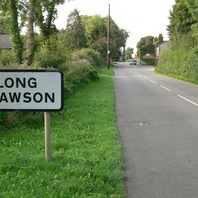
Viking Names
Long Clawson
Long Clawson, in the Framland Hundred of Leicestershire, likely comes from the Old Danish male personal name Klak (Old Norse Klakkr), an original byname probably meaning ‘a lump, a clod’. This personal name is frequently found throughout the Danelaw and occurs in other place-names such as Claxby, Lincolnshire, and Claxton, North Yorkshire. Alternatively, the first element has been suggested to be Old English clacc ‘a hill, a peak’. The second element is Old English tun ‘an enclosure; a farmstead; a village; an estate’. The village is variously described as in the Vale referring to the Vale of Belvoir, and since c. 155o the affix had been Long from Old English lang ‘long’ likely because the township is of linear formation and is approximately one mile in length.
Read More
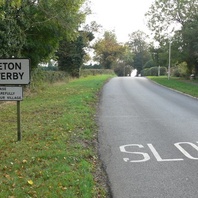
Viking Names
Smeeton Westerby
Smeeton Westerby, in the Gartree Hundred of Leicestershire, was originally two separate settlements. The earlier settlement is Smeeton which comes from Old English smið ‘smith, a worker in metal’ and Old English tun ‘an enclosure; a farmstead; a village; an estate’. The later settlement, Westerby, is a Scandinavian compound from Old Norse vestr ‘west, westerly’ and Old Norse by ‘a farmstead, a village’. Westerby is presumably an offshoot of Smeeton as the name refers to its location being slightly to the west of Smeeton.
Read More
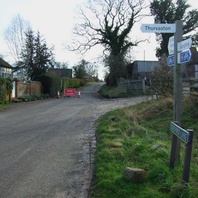
Viking Names
Thurvaston
Thurvaston, in the Appletree Hundred of Derbyshire, comes from the Old Norse male personal name Þurferð and the Old English tun ‘farm, settlement’. It is thus a hybrid name. The same personal name appears in Thoroton in Nottinghamshire. This personal name normally appears in Scandinavian sources in its contracted form, Þórðr, while the full form appears in runic and other sources in Sweden. Thurvaston is a joint parish with Osleston.
Read More
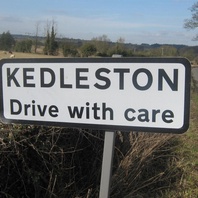
Viking Names
Kedleston
Kedleston, in the Appletree Hundred of Derbyshire, is a hybrid formation of the common Old Norse male personal name Ketill and the Old English element tun ‘farm, settlement’.
Read More

Viking Names
Spilsby
The name of Spilsby, in the Bolingbroke Wapentake of Lincolnshire, comes from the Old Norse male byname Spillir and the Old Norse element by ‘farm, settlement’.
Read More
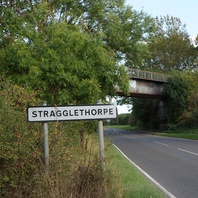
Viking Names
Stragglethorpe
Stragglethorpe, in the Bingham Wapentake of Nottinghamshire, is a hamlet whose name is first recorded in the late eighteenth century. While it does contain the Old Norse element þorp ‘outlying farm, settlement’, it is not clear that the name is as old as the Scandinavian settlement of the region. It has been suggested that it is a name of the late nickname type, referring to an area with a few small straggling farms.
Read More
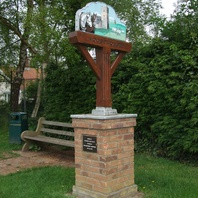
Viking Names
Hogsthorpe
Hogsthorpe, in the South Riding of Lindsey in Lincolnshire, is a hybrid name. The first element of the place-name is either Old English hogg ‘a hog, a pig’ or the Old English male personal name Hogg. The second element is Old Norse þorp ‘a secondary settlement, a dependent outlying farmstead or hamlet’.
Read More

Viking Names
Stenson
Stenson, in the Appletree Hundred of Derbyshire, is an Anglo-Scandinavian compound from the Old Norse male personal name Steinn and Old English tun ‘an enclosure; a farmstead; a village; an estate’. It is a joint parish with Twyford.
Read More

Viking Names
Hasland
Hasland, in the Scarsdale Hundred of Derbyshire, is an Anglo-Scandinavian compound from Old English hæsel ‘a hazel-tree’ and Old Norse lundr ‘a small wood’. Earlier forms of the place-name such as Heselunt and Heslond show influence from Old Norse hesli ‘hazel-wood’.
Read More
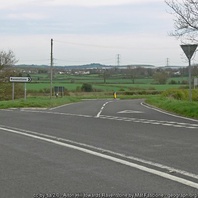
Viking Names
Ravenstone
Ravenstone, in the West Goscote Hundred of Leicestershire, is a hybrid name from the common Old Norse male personal name Hrafn combined with Old English tun ‘farm, settlement’. It has been suggested that the first element might be the Old English male personal name Hræfn, but it is unlikely. Ravenstone was originally part of the Repton and Gresley Hundred in Derbyshire and was transferred to Leicestershire in 1884 as a joint parish with Snibstone.
Read More

Viking Names
Swithland
Swithland, in the West Goscote Hundred of Leicestershire, comes from Old Norse sviðinn ‘land cleared by burning’ and Old Norse lundr ‘a small wood’. Thus the place-name has the meaning of ‘the wood next to or containing land cleared by burning’.
